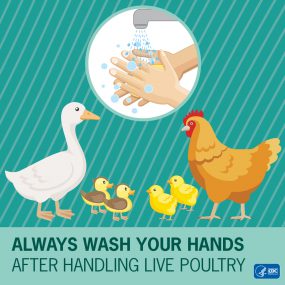
Salmonella Infections Linked to Backyard Poultry
- Reported Cases: 465
- States: 42
- Hospitalizations: 86
- Deaths: 1

-
- Since the last update on May 20, 2020, 368 more ill people were added to this investigation.
- As of June 23, 2020, 465 people infected with one of the outbreak strains of Salmonella have been reported from 42 states.
- 86 people (36% of those with information available) have been hospitalized. One death in Oklahoma has been reported.
- 31% of ill people are children younger than 5 years of age.
- Epidemiologic evidence shows that contact with backyard poultry (such as chicks and ducklings) is the likely source of these outbreaks.
-
- In interviews with 226 ill people, 179 (79%) reported contact with chicks and ducklings.
- People reported obtaining chicks and ducklings from several sources, including agricultural stores, websites, and hatcheries.
Advice to Backyard Flock Owners
-
You can get sick with a Salmonella infection from touching backyard poultry or their environment. Backyard poultry can carry Salmonella bacteria even if they look healthy and clean and show no signs of illness. Follow these tips to stay healthy with your backyard flock:
Wash your hands.
-
- Always wash your hands with soap and water right after touching backyard poultry, their eggs, or anything in the area where they live and roam.
- Adults should supervise handwashing by young children.
- Use hand sanitizer if soap and water are not readily available.
- Read More:

Carol graduated from Riverside White Cross School of Nursing in Columbus, Ohio and received her diploma as a registered nurse. She attended Bowling Green State University where she received a Bachelor of Arts Degree in History and Literature. She attended the University of Toledo, College of Nursing, and received a Master’s of Nursing Science Degree as an Educator.
She has traveled extensively, is a photographer, and writes on medical issues. Carol has three children RJ, Katherine, and Stephen – one daughter-in-law; Katie – two granddaughters; Isabella Marianna and Zoe Olivia – and one grandson, Alexander Paul. She also shares her life with her husband Gordon Duff, many cats, and two rescues.
ATTENTION READERS
We See The World From All Sides and Want YOU To Be Fully InformedIn fact, intentional disinformation is a disgraceful scourge in media today. So to assuage any possible errant incorrect information posted herein, we strongly encourage you to seek corroboration from other non-VT sources before forming an educated opinion.
About VT - Policies & Disclosures - Comment Policy




Just exactly where did the homegrown chickens get salmonella?
nawlins, they can get it from rodent droppings and chicks can get it form their mothers. There can be salmonella in waterers or feed that has been contaminated with droppings. Apparently even feather dander can harbor salmonella. Birds do not have to be ill with salmonella bacteria to contaminate other chickens or yourself if you handle them and do not wash your hands afterwards. Part of having backyard chickens it to have them vetted and that vetting will include checking them for salmonella which can be treated with antibacterials.
In my country, since USSR times there was always a mandatory iron rule: when you come home, – always wash hands with soap. Before eating, – always wash the hands, even if you were at home just reading the book. Always take off shoes when come home. Always change your clothes when come home from the street. Clothes for home and clothes for going outdoors are different stuff.
Andy, These are all very good practices. Cannot wash those hands enough…especially now!
Comments are closed.